27 start with P start with P

The dramatic story of the fights and compromises that shaped an Irish community
Disdained by many Yankee residents as Catholic lowlifes, the growing Irish population of the Lowell, Massachusetts, “paddy camps” in the nineteenth century proved a tempting source of cheap labor for local mill owners, who took advantage of the immigrants’ proximity to exploit them to the fullest. Displaced by their cheaper labor, other workers blamed the Irish for job losses and added to their plight through repression and segregation.
Now in paperback and featuring a new preface, Brian C. Mitchell’s The Paddy Camps demonstrates how the Irish community in Lowell overcame adversity to develop strong religious institutions, an increased political presence, and a sense of common traditions.
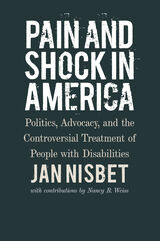
For more than forty years, professionals in the field of disability studies have engaged in debates over the use of aversive interventions (such as electric shock) like the ones used at the Judge Rotenberg Center. Advocates and lawyers have filed complaints and lawsuits to both use them and ban them, scientists have written hundreds of articles for and against them, and people with disabilities have lost their lives and, some would say, lived their lives because of them. There are families who believe deeply in the need to use aversives to control their children’s behavior. There are others who believe the techniques used are torture. All of these families have children who have been excluded from numerous educational and treatment programs because of their behaviors. For most of the families, placement at the Judge Rotenberg Center is the last resort.
This book is a historical case study of the Judge Rotenberg Center, named after the judge who ruled in favor of keeping its doors open to use aversive interventions. It chronicles and analyzes the events and people involved for over forty years that contributed to the inability of the state of Massachusetts to stop the use of electric shock, and other severe forms of punishment on children and adults with disabilities. It is a long story, sad and tragic, complex, filled with intrigue and questions about society and its ability to protect and support its most vulnerable citizens.
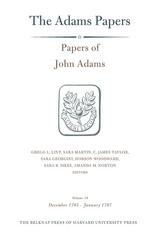
Volume 18 is the final volume of the Papers of John Adams wholly devoted to Adams’ diplomatic career. It chronicles fourteen months of his tenure as minister to Great Britain and his joint commission, with Thomas Jefferson, to negotiate treaties with Europe and North Africa. With respect to Britain, Adams found it impossible to do “any Thing Satisfactory, with this Nation,” and the volume ends with his decision to resign his posts. His diplomatic efforts, Adams thought, were too much akin to “making brick without straw.”
John Adams’ ministerial efforts in London were disappointing, but other aspects of his life were not. He and Jefferson failed to finalize treaties with Portugal and Great Britain, but they did, through agent Thomas Barclay, conclude a treaty with Morocco. Barclay’s letters are the earliest and most evocative American accounts of that region. Adams witnessed the marriage of his daughter, Abigail 2d, to William Stephens Smith, promoted the ordination of American Episcopal bishops, and toured the English countryside, first with Thomas Jefferson and then with his family. Most significant perhaps was the publication of the first volume of Adams’ Defence of the Constitutions of Government of the United States of America. This work is often attributed to concern over Shays’ Rebellion, of which Adams knew little when he began drafting. In fact, it was Adams’ summer 1786 visit to the Netherlands that provoked his work. There, Dutch Patriot friends, involved in their own revolution, expressed interest in seeing “upon paper” his remarks “respecting Government.”
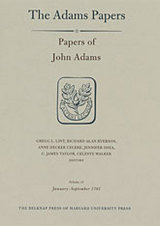
In mid-March 1781, John Adams received his commission and instructions as minister to the Netherlands and embarked on the boldest initiative of his diplomatic career. Disappointed by the lack of interest shown by Dutch investors in his efforts to raise a loan for the United States, Adams changed his tactics, and in a memorial made a forthright appeal to the States General of the Netherlands for immediate recognition of the United States. Published in Dutch, English, and French, it offered all of Europe a radical vision of the ordinary citizen’s role in determining political events. In this volume, for the first time, the circumstances and reasoning behind Adams’s bold moves in the spring of 1781 are presented in full.
In July the French court summoned Adams, the only American in Europe empowered to negotiate an Anglo–American peace, to Paris for consultations regarding an offer made by Austria and Russia to mediate the Anglo–French war. In his correspondence with France’s foreign minister, the Comte de Vergennes, Adams passionately insisted that the United States was fully and unambiguously independent and sovereign and must be recognized as such by Great Britain before any negotiations took place. This volume shows John Adams to be a determined and resourceful diplomat, unafraid to go beyond the bounds of traditional diplomacy to implement his vision of American foreign policy.
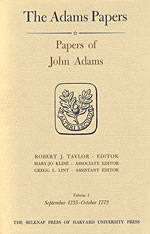
No family in three generations has contributed so much to American history as the Adamses. John Adams, John Quincy Adams, and Charles Francis Adams, despite periods of doubt, knew that history, if not their contemporaries, would recognize their accomplishments. When the Adams Papers series is complete, the writings of these three statesmen will have been examined thoroughly.
Aside from the Legal Papers of John Adams, published in 1965, these two volumes are the first in Series III: General Correspondence and Other Papers of the Adams Statesmen. Volumes 1 and 2 of the Papers of John Adams include letters to and from friends and colleagues, reports of committees on which he served, his polemical writings, published and unpublished, and state papers to which he made a contribution.
All of Adams’s newspaper writings, including “A Dissertation on the Canon and the Feudal Law,” are in these two volumes. In addition to being a condemnation of the Stamp Act, the “Dissertation” is shown to be one of the building blocks of the theory of a commonwealth of independent states under the king, which reaches complete statement in the Novanglus letters. For the first time, all thirteen of these letters appear in full with annotation.
The period September 1755 to April 1775 covers Adams’s public service in Braintree and Boston town meetings, the Massachusetts House of Representatives, the First Continental Congress, and the First Provincial Congress of Massachusetts. During this time his political future was being shaped by circumstances not always of his choosing. He hesitated at first at the threshold of a public career, political ambition in conflict with concern for his family’s well-being. But as the confrontation with Great Britain sharpened, the crisis became acute; no choice remained. For Adams there was no shirking the path of duty.
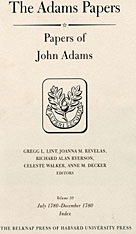
On the last day of December 1780, John Adams wrote that he had just spent “the most anxious and mortifying Year of my whole Life.” He had resided first at Paris, then at Amsterdam, attempting, without success, to open Anglo–American peace negotiations and to raise a Dutch loan. In volumes 9 and 10 of the Papers of John Adams, over 600 letters and documents that Adams sent to and received from numerous correspondents in Europe and America provide an unparalleled view of Adams’s diplomacy and a wealth of detail on the world in which he lived.
These volumes chronicle Adams’s efforts to convince the British people and their leaders that Britain’s economic survival demanded an immediate peace; his “snarling growling” debate with the French foreign minister, the Comte de Vergennes, over the proper Franco–American relationship; and his struggle to obtain a loan in the Netherlands, where policies were dictated by Mammon rather than republican virtue. Adams’s writings, diplomatic dispatches, and personal correspondence all make clear the scope of his intelligence gathering and his propaganda efforts in the British, French, and Dutch press. The letters reflect his interest in Bordeaux wines, the fate of Massachusetts Constitution that he had drafted in 1779, and political developments in Philadelphia, Boston, London, and St. Petersburg. The volumes leave no doubt as to John Adams’s unwavering commitment to the American cause. Even in this most difficult year, he believed the revolution in America to be “the greatest that ever took Place among Men.” He felt honored to serve a new nation where “the Wisdom and not the Man is attended to,” whose citizens were fighting a “People’s War” from which the United States would inevitably emerge victorious to take its rightful place on the world stage.
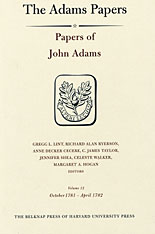
The American victory at Yorktown in October 1781 and the fall of Lord North’s ministry in March 1782 opened the possibility that John Adams might soon be involved in negotiations to end the war for American independence. To prepare for the occasion, Adams and Benjamin Franklin discussed in their letters the fundamentals for peace. Adams made it clear to the British government that there would be no negotiations without British recognition of the United States as independent and sovereign.
This volume chronicles Adams’s efforts, against great odds, to achieve formal recognition of the new United States. The documents include his vigorous response to criticism of his seemingly unorthodox methods by those who would have preferred that he pursue a different course, including Congress’s newly appointed secretary for foreign affairs, Robert R. Livingston.
In April 1782 the Netherlands recognized the United States and admitted John Adams as its minister. For Adams it was “the most Signal Epocha, in the History of a Century,” and he would forever see it as the foremost achievement of his diplomatic career. The volume ends with Adams, at long last a full-fledged member of the diplomatic corps, describing his reception by the States General and his audiences with the Prince and Princess of Orange.
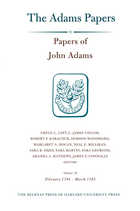
“Once more after an Interruption of ten Years, I pronounce myself a happy Man, and pray Heaven to continue me so.” Thus wrote John Adams in late August 1784 after the arrival in Europe of his wife Abigail and daughter Nabby. Adams and his family were living together in the pleasant Paris suburb of Auteuil. There Adams, with Benjamin Franklin and Thomas Jefferson, formed a joint commission to conclude commercial treaties with the nations of Europe and North Africa. For the first time since he had left America in 1778 on his first diplomatic mission, Adams was no longer engaged in “militia diplomacy.”
Volume 16 of the Papers of John Adams chronicles fourteen months of Adams’ diplomatic career. As minister to the Netherlands he raised a new Dutch loan to save America from financial ruin. As joint commissioner he negotiated a commercial treaty with Prussia, proposed similar treaties with other European nations, and prepared to negotiate with the Barbary states. The commissioners also sought to resolve Anglo-American differences left over from the peace negotiations and arising from the two nations’ burgeoning trade. Volume 16 thus forms a prelude to the next phase of John Adams’ diplomatic career, for his February 1785 appointment as minister to the Court of St. James meant that the management of Anglo-American relations would be his responsibility alone.



“Huzza for the new World and farewell to the Old One,” John Adams wrote in late 1787, wrapping up a decade’s worth of diplomatic service in Europe. Volume 19 of the Papers of John Adams chronicles Adams’s last duties in London and The Hague. In the twenty-eight months documented here, he petitioned the British ministry to halt impressment of American sailors, toured the English countryside, and observed parliamentary politics. Adams salvaged U.S. credit by contracting two new Dutch loans amid the political chaos triggered by William V’s resurgence. Correspondents like Thomas Jefferson and the Marquis de Lafayette mulled over the Anglo–American trade war that followed the Revolution and reported on the French Assembly of Notables—topics that Adams commented on with trademark candor. He wrote the final two volumes of his work, A Defence of the Constitutions of Government of the United States of America.
Adams yearned to return home and see the American republic take shape. “For a Man who has been thirty Years rolling like a stone,” Adams wrote, the choice was whether to “set down in private Life to his Plough; or push into turbulent scenes of Sedition and Tumult; whether be sent to Congress, or a Convention or God knows what.” Back on his native soil of Massachusetts in June 1788, Adams settled into rural retirement with wife Abigail and watched the U.S. Constitution’s ratification evolve. By volume’s end, John Adams again resumes public life, ready to serve as America’s first vice president.

"You may well Suppose that I was the Focus of all Eyes," John Adams wrote on 2 June 1785 of his first audience with George III, which formally inaugurated the post of American minister to Great Britain. Eager to restore "the old good Nature and the old good Humour" between the two nations, Adams spent the following months establishing the U.S. legation at No. 8 Grosvenor Square. For Adams, it was a period of multiple responsibilities and mixed success. He remained minister to the Netherlands and one of the joint commissioners charged with negotiating commercial treaties with the nations of Europe and North Africa--sensitive duties that occasionally called for Adams to encode his correspondence with the aid of his new secretary and future son-in-law, Col. William Stephens Smith.
Rebuffed by the British ministry in his mission to enforce the peace treaty of 1783 and renew Anglo-American commerce, Adams identified and achieved other goals. He preserved American credit despite the bankruptcy of a Dutch banking house that handled U.S. loans, petitioned for the release of impressed sailors, marked the ratification of the Prussian-American treaty, championed the needs of the American Episcopal Church, and laid the groundwork for negotiations with the Barbary States. His attention was not confined solely to foreign affairs. John Adams's letters from London, laced with his trademark candor, demonstrate his ripening Federalist view of the new American government's vulnerability and promise.

On September 3, 1783, John Adams, Benjamin Franklin, and John Jay signed the definitive Anglo-American peace treaty. Adams and his colleagues strived to establish a viable relationship between the new nation and its largest trading partner but were stymied by rising British anti-Americanism.
Adams’ diplomatic efforts were also complicated by domestic turmoil. Americans, in a rehearsal for the later Federalist-Antifederalist conflict over the United States Constitution, were debating the proper relationship between the central government and the states. Adams, a Federalist as early as 1783, argued persuasively for a government that honored its treaties and paid its foreign debts. But when bills far exceeding the funds available for their redemption were sent to Europe, he was forced to undertake a dangerous winter journey to the Netherlands to raise a new loan and save the United States from financial disaster.
None of the founding fathers equals the candor of John Adams’ observations of his eighteenth-century world. His letters, always interesting, reveal with absolute clarity Adams’ positions on the personalities and issues of his times.

John Adams reached Paris on October 26, 1782, for the final act of the American Revolution: the peace treaty. This volume chronicles his role in the negotiations and the decision to conclude a peace separate from France. Determined that the United States pursue an independent foreign policy, Adams's letters criticized Congress's naive confidence in France. But in April 1783, frustrated at delays over the final treaty and at real and imagined slights from Congress and Benjamin Franklin, Adams believed the crux of the problem was Franklin's moral bankruptcy and servile Francophilia in the service of a duplicitous Comte de Vergennes.
Volume 14 covers more than just the peace negotiations. As American minister to the Netherlands, Adams managed the distribution of funds from the Dutch-American loan. Always an astute observer, he commented on the fall of the Shelburne ministry and its replacement by the Fox-North coalition, the future of the Anglo-American relationship, and the prospects for the United States in the post-revolutionary world. But he was also an anxious father, craving news of John Quincy Adams's slow journey from St. Petersburg to The Hague. By May 1783, Adams was tired of Europe, but resigned to remaining until his work was done.

A new chapter in John Adams's diplomatic career opened when the Dutch recognized the United States in April 1782. Operating from the recently purchased American legation at The Hague, Adams focused his energies on raising a much needed loan from Dutch bankers and negotiating a Dutch-American commercial treaty. This volume chronicles Adams's efforts to achieve these objectives, but it also provides an unparalleled view of eighteenth-century American diplomacy on the eve of a peace settlement ending the eight-year war of the American Revolution.
John Adams was a shrewd observer of the political and diplomatic world in which he functioned and his comments on events and personalities remain the most candid and revealing of any American in Europe. His correspondence traces the complex negotiations necessary to raise a Dutch loan and throws new light on his conclusion of a treaty of amity and commerce with the Netherlands, achievements of which he was most proud. Events in England and elsewhere in Europe also provided grist for his pen. Would the establishment in July of a new ministry under the earl of Shelburne hinder or advance the cause of peace? That question bedeviled Adams and his correspondents for the fate of the new nation literally rode on its answer. The volume ends with Adams's triumphal departure from The Hague to face new challenges at Paris as one of the American commissioners to negotiate an Anglo-American peace treaty.

These volumes provide an unparalleled account of the conduct of American diplomacy in the early years of the republic, while the war with Britain continued and after the treaty of alliance with France was signed. John Adams served for ten months as a commissioner to France. Though he was the newest member of the three-man commission, he was its chief administrator, handling most of its correspondence, and his papers are the first full documentary record of the commission ever published. They provide a wealth of detail on every aspect of diplomacy, from negotiations with ministers of state to the arranging of prisoner exchanges.
The documents throw new light on Adams’s relations with his fellow commissioners, Benjamin Franklin and Arthur Lee. Historians have depicted Adams as hostile to Franklin and supportive of Lee, but the record shows that he found himself increasingly in disagreement with Lee, while working harmoniously with Franklin from the outset. Moreover, after the commission was disbanded in February 1779 and Franklin was appointed Minister to France—a move Adams had advocated—he undertook an important mission at Franklin’s behest. It is now clear that the rift that developed between the two statesmen did not begin until after Adams’s return to Paris in 1780.
Legal and constitutional scholars will find Volume 8 of particular interest. The Massachusetts Constitution of 1780, drafted by John Adams in 1779, served as a crucial source for the Constitution of the United States; today it is the oldest written constitution in the world still in effect. The earliest surviving version of Adams’s text, the Report of a Constitution for the Commonwealth of Massachusetts, is here published with full annotation for the first time. It is John Adams’s most enduring constitutional work.

These volumes document John Adams’s thinking and actions during the final years of his congressional service and take him through his first five months as a Commissioner in France in association with Benjamin Franklin and Arthur Lee.
While Adams was still in Philadelphia, military matters continued to he his major concern. Most demanding was his presidency of the Board of War, which took up his “whole Time, every Morning and Evening.” In general, though, the documents and reports of his conduct reveal a commitment to a national outlook. Congress should be a national legislature, and personal, state, and regional rivalries should give way to concern for the greater good—these were his deeply held convictions.
When chosen a Commissioner to France, Adams was reluctant to go. But duty and the honor of the position, along with the encouragement of an understanding and self-sacrificing wife, persuaded him to accept. With son John Quincy for a companion, he crossed the Atlantic to a new career. His initiation into the complexities of diplomacy brought a growing awareness of European affairs and the problems facing the new nation in the diplomatic arena. Letters deal with such varied topics as the supervision of American commercial agents in French ports, regulation of privateers, settlement of disputes between crews and officers, negotiation of loans, and help for American prisoners in England. Personal letters run the gamut from Adams’s views on the proper conduct of American diplomacy to strangers’ pleas for aid in locating relatives in America. Contrary to the usual impression of Adams as little more than a clerk for the Commission, evidence shows that he was its chief administrator.
Acclimation to living abroad among diplomats did not stifle Adams’s yearning for the simplicities of private life in the midst of his family. Yet as the important and interesting documents of this volume show, the groundwork was being laid for his even more significant role in diplomacy.

As the American colonies grew more restive, and a break with the mother country ceased to be unthinkable, John Adams was forced to spend less and less time with his beloved family. Although burdened by ever-expanding responsibilities in the Second Continental Congress, he found time for an amazing amount of correspondence. The majority of his letters were written to secure the facts that would enable this duty-ridden man to decide and act effectively on the issues being debated. Military affairs, a source of never-ending concern, provide some of the most fascinating subjects, including several accounts of the Battle of Bunker Hill, assessments of various high-ranking officers, and complaints about the behavior of the riflemen sent from three states southward to aid the Massachusetts troops.
The heated question of pay for soldiers and officers strained relations between New England and southern colonies early. By refusing to confront the issue of slavery when it was raised by several correspondents, Adams sought to avoid exacerbating regional sensitivities further. When the question of independent governments for former colonies arose, at the request of several colleagues Adams sketched a model, Thoughts on Government, three versions of which are included here.
His optimistic republicanism, however, was balanced by fear that a “Spirit of Commerce” would undermine the virtue requisite for republican institutions. Adams' important committee work included his draft in 1775 of rules for regulation of the Continental Navy, which have remained the basis for the governance of the United States Navy down into our own time, and his plan of treaties, which would guide American diplomats up to World War II. Both were derivative, but he skillfully adapted his materials to American needs and circumstances. These volumes reflect the spirit of those tumultuous years when the leaders emerging in America confronted each other, and exciting new ideas, as they tried to resolve the issues of a revolutionary period.

This is the compelling story of an experiment begun in 1961 that eventually affected the lives of almost all of the residents of the island of Martha's Vineyard. The author writes engagingly of the island and its year-round inhabitants, a community of some seven thousand persons of diverse ethnic and social backgrounds.
With sympathy and insight Milton Mazer analyzes the stresses that are peculiar to the conditions of life on the island, and he describes the kinds of psychological disorders that are precipitated by those stresses. He reports, without technical jargon, the results of a five-year study of a great variety of psychosocial predicaments experienced by the people of the island. Finally he examines the catalytic effect the mental health center and its research findings have had on the development of other supportive agencies and how the community established a network of human services to meet its needs.
The work clearly demonstrates that striking advances can be made by a mental health program that is informed by an understanding of the community served. The book will stand as a model for future studies in this area.
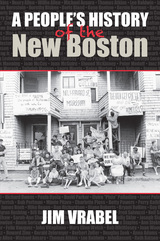
Credit for the city's turnaround since that time is often given to a select group of people, all of them men, all of them white, and most of them well off. In fact, a large group of community activists, many of them women, people of color, and not very well off, were also responsible for creating the Boston so many enjoy today. This book provides a grassroots perspective on the tumultuous 1960s and 1970s, when residents of the city's neighborhoods engaged in an era of activism and protest unprecedented in Boston since the American Revolution.
Using interviews with many of those activists, contemporary news accounts, and historical sources, Jim Vrabel describes the demonstrations, sit-ins, picket lines, boycotts, and contentious negotiations through which residents exerted their influence on the city that was being rebuilt around them. He includes case histories of the fights against urban renewal, highway construction, and airport expansion; for civil rights, school desegregation, and welfare reform; and over Vietnam and busing. He also profiles a diverse group of activists from all over the city, including Ruth Batson, Anna DeFronzo, Moe Gillen, Mel King, Henry Lee, and Paula Oyola. Vrabel tallies the wins and losses of these neighborhood Davids as they took on the Goliaths of the time, including Boston's mayors. He shows how much of the legacy of that activism remains in Boston today.
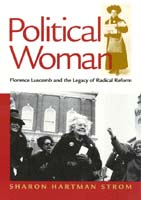
Politcal Women counters the traditional narratives that place men at the center of political thinking and history. Showing how three generations of Luscomb's family had set the stage for her activism, this biography presents her story against the backdrop of Boston's politics and larger struggles for social justice. Luscomb participated in every significant social reform movement of her time -- from securing women's right to vote and supporting trade unionism to advocating an end to the war in Vietnam. Luscomb also ran for public office; she was narrowly defeated when she ran for Boston's city council in 1922. Although unsuccessful as a third-party candidate for Congress (in 1936 and 1950) and for Governor of Massachusetts (in 1952), she was one of the few women of her time to seek office. Independent, athletic, and spirited, she apparently never thought that traditional gender prescriptions applied to her. A practicing architect before the First World War, an exuberant hiker all her life, and a member in collective-living arrangements, Luscomb enjoyed a life of rich experiences and sustaining relationships.
In Florence Luscomb's biography, Sharon Hartman Strom suggests that although women were excluded from the activities and sites associated with conventional politics until recently, they did political work that gave purpose to their lives and affected political thinking in their communities, states, and ultimately the nation.
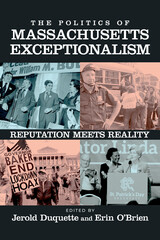
Are claims of Massachusetts’s special and instructive place in American history and politics justified? Alternately described as a “city upon a hill” and “an organized system of hatreds,” Massachusetts politics has indisputably exerted an outsized pull on the national stage. The Commonwealth’s leaders often argue for the state’s distinct position within the union, citing its proud abolitionist history and its status as a policy leader on health care, gay marriage, and transgender rights, not to mention its fertile soil for budding national politicians. Detractors point to the state’s busing crisis, sky high levels of economic inequality, and mixed support for undocumented immigrants.
The Politics of Massachusetts Exceptionalism tackles these tensions, offering a collection of essays from public policy experts that address the state’s noteworthy contributions to the nation’s political history. This is a much-needed volume for Massachusetts policymakers, journalists, and community leaders, as well as those learning about political power at the state level, inside and outside of the classroom. Contributors include the editors as well as Maurice T. Cunningham, Lawrence Friedman, Shannon Jenkins, Luis F. Jiménez, and Peter Ubertaccio.
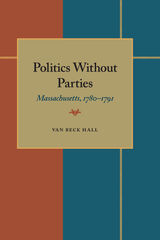

Two hundred and thirty-four striking photographs of the port of Boston combine with interpretive commentary to recapture the flavor, buoyancy, and excitement of the city’s years as one of the two or three great American ports. After the Civil War Boston underwent a radical and successful transformation from a declining mercantile home port to an important and competitive modern seaport. At the same time the transition from sail to steam was taking place. Photographic studies of deep water sail and steam vessels, naval ships, fishing boats, catboats, tugs, schooners, and sloops, and of the picturesque wharves—all create a kaleidoscopic visual history of these years of change.
The volume offers, as well, some of the most distinguished early work in photography, including the widest selection ever published of photographs by pioneer marine photographer Nathaniel Stebbins.
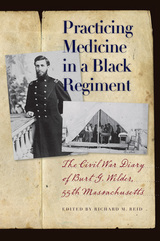
Burt Green Wilder, a Boston-born, Harvard-educated doctor-in-training, was among the first white officers commissioned to staff the 55th Massachusetts. Like other officers serving in the state's African American units, Wilder was selected for his military experience, his "firm Anti-Slavery principles," and his faith in the value of black troops. From the time he joined the 55th in May 1863 until the regiment was discharged in September 1865, Wilder recorded his experiences and observations. He described the day-to-day activities of a Civil War surgeon, the indignities suffered by black enlisted men at the hands of a War Department that denied them the same treatment offered to white troops, and the role of the regiment in the campaign around Charleston and in Florida.
Service in the southern states also allowed Wilder to indulge a passion for natural science and comparative anatomy, including the collection of unusual species, one of which—the spider known as Nephila wilderi—still bears his name. After the war he completed his medical studies at Harvard and joined the faculty of Cornell University, where he became a distinguished professor of zoology as well as an outspoken advocate of racial equality.
In his introduction to the volume, Richard M. Reid analyzes Burt Wilder's diary and places it within the context of the war, the experience of African American troops, and Wilder's life and career.

The 1970s were tumultuous years in American prisons, beginning with the bloody uprising at Attica and ending with the even bloodier one at New Mexico State. The Massachusetts prison system was one of the most seriously afflicted. Murders, suicides, riots, strikes, and mass escapes were only the most obvious manifestations of a system in turmoil. Attempts at reform foundered badly there, in part because of strong opposition from prison "guards" or
officers. Kelsey Kauffman's unsparing account of life "on the inside" during that troubled time takes the usually neglected perspective of prison officers. The setting is primarily the maximum-security institution, Walpole; the voices are those of men who felt as trapped as the inmates they guarded.
Prison officers have a subculture and "code" of behavior as binding as that of inmates. As Kauffman quickly makes clear, what recruits learned from their fellow officers—and inmates—was far more important in how they adjusted to the harsh prison environment than was the inadequate instruction they received from the Department of Correction. She describes in detail the role of officers in the everyday life of the prison, their relationship to a seemingly uncaring prison administration, their power struggles with inmates, their methods for coping with inmate violence, and the consequences of their own resort to violence against inmates.
Through the pain filled words of the officers themselves, she chronicles the devastating effect that working in prison had on them and their families. Prison officers, Kauffman argues, are a badly misunderstood and often maligned group. Failure to appreciate their problems and perspectives has inevitably undermined attempts to reform prisons and contributed to the general misery of those who live and work behind prison walls. Although the events that Kauffman discusses helong to a particularly violent time and place, the underlying problems do not. In varying intensity they characterize most prisons most of the time.

Public Health and the State constitutes both a fine piece of social history and an ideal model for evaluating our current definition of public health. In this thought-provoking account, Ms. Rosenkrantz perceptively traces the development of the Massachusetts State Board of Health--established in 1869 as the first state institution in the United States responsible for preventing unnecessary mortality and promoting all aspects of public health.
This study describes the areas in which state responsibility for deterring disease assumed increased authority after the Civil War. It begins at a time when the definition of health' implied that it could be achieved, supported by the perfectionist belief that a healthy populace--obedient to the laws of nature--guaranteed a sound society. As rapid urban and industrial growth began to sweep the country, however, there was an expressed concern that this expansion threatened the health and morals of the people. During this period, when the etiology of disease was ascribed to a variety of environmental and behavioral factors, the Massachusetts Board developed a comprehensive program of investigation and advice on such diverse issues as housing, water supplies, slaughterhouse conditions, and the use of alcohol.
Later, as specific medical prophylaxis and therapy came to characterize public health policy, the relationship between sanitary science and social reform was redefined by both professional standards and public expectation. The State Board depended less and less upon its ability to influence individual conduct. Laboratory scientists, chemists, and physicians, who tended to describe disease in biological terms, directed public health toward science.
In view of pressing public health problems posed by such hazards as drug abuse and environmental pollution, Ms. Rosenkrantz warns us that it is as important to identify the origins of the social and scientific assumptions regarding public health as it is to discover the biological etiology of disease. The last chapter of Public Health and the State suggests that the goal of perfect health, based upon the ideal concepts of the past, may no longer be a viable objective. For these reasons she views the development of the Massachusetts State Board of Health as "the story of a successful endeavor that can never be re-enacted."
READERS
Browse our collection.
PUBLISHERS
See BiblioVault's publisher services.
STUDENT SERVICES
Files for college accessibility offices.
UChicago Accessibility Resources
home | accessibility | search | about | contact us
BiblioVault ® 2001 - 2024
The University of Chicago Press









